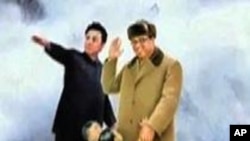Human rights organizations say tens of thousands of North Koreans live in forced labor camps for political reeducation, where torture, starvation, and illness are commonplace. North Korean defectors say entire families are sent to the camps for tiny crimes such as humming a South Korean pop song. Now, a new film is bringing the stories of North Koreans who have escaped such camps to the screen.
| North Korea Propaganda, Kim Jong Il And Kim Il Sung: "Nobody in the world has ever dedicated all his life to the people's cause for so many years and undergone so many hardships as our leader has done." |
Kimjongilia aims to introduce a global audience to the stories of real North Koreans who were brutally punished in labor camps before escaping their country.
In the film, a man says, "I was hung upside down for 14 hours and beaten." "We never knew when we'd get beaten. There was constant fear."
Kimjongilia is the English name of a flower hybrid that North Korea named after its leader. Pyongyang says the flower embodies the "peace, love, justice, and wisdom" of Kim Jong Il himself, as well as his father, Kim Il Sung.
Kimjongilia director Nancy Heikin says her choice of title is just as ironic as her use of North Korean imagery. "It's just the opposite of what they say. Here is the propaganda, here is their footage, here is the image they wish to show what a wonderful place this is," she explains, "and here is the testimony of people who have been there."
"I'm filled with hatred," says one defector, "of North Korea that murdered my family."
Actual footage from North Korea is in short supply, so Heikin has added some artistic touches to the film, like interpretive dance.
Heikin says she has wanted to make the film for years, to express her outrage at what she calls North Korea's "concentration camps.""And I also think there's no one to blame but Kim Jong Il and the regime, I don't think no matter how you twist the politics and what you think happened at the division of Korea 1945 and the mess of the war - that the fact of concentration is anyone's fault but the North Korean regime," she said.
All of the North Korean defectors featured in Kimjongilia now live in South Korea. Most made a dangerous and illegal journey into China first. Their personal stories of sex trafficking, torture, and the death of loved ones weave a dark backdrop for North Korea's utopian self-imagery.
"You can understand being swept up in that. It is not just the slamming on the head -- there is that, there is the terror," Heikin states, "But there is also this inspiration that they keep feeding - in quite an amazing way."
Heikin says telling the story of average North Koreans has become a passion, and may work on a follow-up to Kimjongilia in the future.




